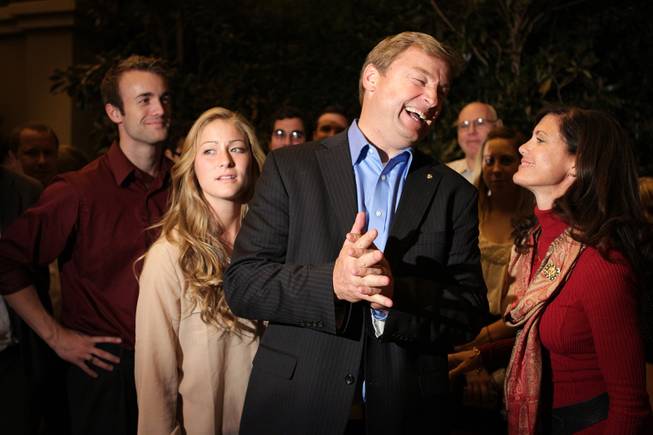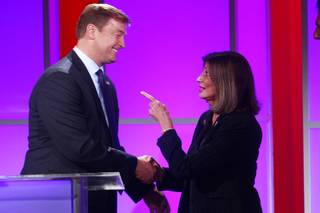
Sen. Dean Heller, R-Nev., with his son Harris, from left, daughter Emmy, and wife Lynne celebrates his victory at the Palazzo in Las Vegas after midnight on Wednesday, November 7, 2012.
Published Tuesday, Nov. 6, 2012 | 4 p.m.
Updated Wednesday, Nov. 7, 2012 | 2:18 a.m.
Sun coverage
Sen. Dean Heller rode to a close but safe victory over Rep. Shelley Berkley Tuesday night, earning a public mandate to occupy the Senate seat he was appointed to in mid-2011. In fending off Berkley, he defied both the Democrats’ registration advantage and the power of their storied get-out-the-vote machine.
Heller won by slightly more than 12,000 votes — or 1.3 percent — in a race that drew almost a million voters from across the state and took until midnight to finally tally.
“I just want to thank Nevada for having enough confidence to take me back,” Heller said at a press conference in a suite at the Palazzo early Wednesday morning, where Heller had been tensely watching the returns and, ultimately, celebrating with family, friends and staffers. “Serving in the United States Senate has been the greatest privilege of my life.”
Berkley came into Election Day with about a four-point lead in the Senate race from early balloting. But Heller all but fully erased it as the precinct numbers started rolling in.
Heller’s burst of strength came from two apparent sources: high turnout in rural counties, where pro-Heller ballots outnumbered pro-Berkley ballots by almost 4 to 1, and crossover voters, who apparently favored Heller over Berkley, even as they favored President Barack Obama over Mitt Romney.
Had Berkley been able to earn the support of every voter who supported Obama, she would have bested Heller handily. But statewide, Berkley fell more than 80,000 votes behind Obama’s totals.
The difference was starkest in swing-district Washoe County, where Heller drew about 21,000 more voters than Berkley, a difference of about 12 percentage points. Obama had secured the support of 22,000 more voters than Berkley.
As Heller widened his lead in Washoe, he also nibbled away at Berkley’s advantage in population-rich Clark County, bringing the race there from a double-digit lead for Berkley to less than 10 percent by the end of the night.
Flanked by supporters and family, including her father and husband, Berkley took the stage at 12:35 a.m. in a royal blue skirt and jacket to concede the race and step out of public life.
She told the crowd, mostly made up of her supporters since the majority of the crowd had left by midnight, that she had called Heller to congratulate him and offer her support.
“I wish him well,” she said “He’s got an enormous task ahead of him in representing the good people of the great state of Nevada. I hope that he knows that he can count on me to for everything I can do to make his term in the U.S. Senate a success.”
Berkley said she enjoyed her time getting to know more of Nevada, and Nevadans, in her first state-wide race.
“It’s been an amazing experience and I would not have traded it for anything in the world. I made the right decision to run, and I’m proud of it.”
Berkley did not offer much insight into her future plans.
“I want to thank each and every one of you for giving me the privilege of representing this remarkable state. I’m better off for taking my life into public service. It’s a calling for me. Now, as I step down from public life and take a new direction that I hope will be as fulfilling for me as representing all of you has been all of these years.”
It’s an important win not only for Heller, but for the Nevada Republican Party as well. Just a few months ago, they were the laughingstock of the national GOP, splintered and overrun by a rowdy Ron Paul faction more desperate to make a national splash for their sherpa than to use their grassroots heft to shore up the party ticket.
But by keeping his distance, Heller’s handlers kept the candidate and campaign on track, keeping a small but steady lead over his opponent Shelley Berkley from the earliest polls through to election night.
In independent polls, Heller had been favored to win this contest for the Senate seat he has held since Gov. Brian Sandoval appointed him to fill out the remainder of John Ensign’s term.
Heller now will be faced with the challenge of earning the trust of more than half the people he represents, establishing an identity separate from attack ads and forging a relationship with Nevada’s more recognizable senator, Harry Reid.
“This year, with the ethics committee and things like that, Heller had a unique opportunity to win an election in a year where he shouldn’t have,” said Billy Vassiliadis, a Democratic strategist and close associate of Reid. “If he doesn’t want to go through what he went through this time ... he has got to get more familiar with Clark County.”
Because it remained so closely fought, the Heller-Berkley race largely defied the logic of what should drive an election in Nevada more often than it was defined by it.
Almost every voter interviewed in the weeks and months leading up to Election Day cited the local unemployment crisis, foreclosure crisis, or some other aspect of Nevada’s worst-in-the-nation economy as their chief concern in the 2012 elections.
Heller and Berkley understood that, and was quick to declare their commitment to creating jobs, jobs, and more jobs.
Perhaps ironically, their campaigns focused more on any issue but the economy.
Allegations over ethics, a war on women, and attacks on each other’s integrity and a Northern-Southern rivalry dominated the contest, as the two slung it out in a mudfight that put questions about the candidates’ character before real conversations about the fate of the state.
“I defy anybody to tell me one new idea or one new innovation that came up in this campaign,” Vassiliadis said. “We’re sitting here with folks out of work, houses underwater, and nobody, even my home guys, have proposed a new idea. And I don’t know how long the voters will tolerate this.”
“I think everybody wants to see how we’re going to get at the issues,” said Sig Rogich, a Republican strategist and Heller supporter. “But for the most part this campaign is not too different from every campaign in America. They all get down to personalities, and they all advertise about how somebody’s mistakes are a reflection of how they would govern.”
Both Berkley and Heller launched their campaigns in the spring of 2011. Berkley sprang to define Heller early on as someone exclusively interested in serving in Washington in order to serve the barons of Big Oil.
“Dean wants to end Medicare as we know it and give billions more in wasteful subsidies to his big oil campaign contributors,” became Berkley’s main argument for the balance of the campaign, serving as a supplementary answer to nearly every question posed to her in the last year.
But Heller was handed a political gift, when allegations surfaced that Berkley had improperly used her congressional seat to lobby other members of Congress and the administration to save a kidney transplant center in Las Vegas and protect Medicare reimbursement rates that benefited her husband’s medical practice. As allegations spun into an official congressional ethics inquiry, the question took center-stage in shifting the tone of the campaign.
While Heller didn’t personally play the card on Berkley’s ethics until the summer of 2012, the outside groups around him seized on it, producing a string of accusing commercials that cited not only Berkley’s troubles with the House Ethics process, but her past experiences of near-misses with the moral side of the law.
On election night, after it was clear he won, Heller refused to answer any questions about the level of vitriol his campaign had spewed over Berkley’s ethics charges.
“I don’t want to get into that. We’re just going to put it behind us,” he said. “Campaign’s over.”
None of Berkley’s counter-punches seemed to be able to quell the questions about her character. So she started throwing the book at Heller, seizing the opportunity of a congressional vote about funding birth control earlier this year to accuse him of being generally “anti-woman.” She also dug up the seemingly shadier points of his past, like his association with money-launderer Eddie Floyd.
Six weeks out, Heller lashed back, calling Berkley “the most unethical, corrupt person I have ever known.”
The ad war and related catfight all but drowned out the debate over their competing views on social safety nets, energy policy, and immigration — issues that do and will continue to affect Nevada over the next six years far more directly than the attack ads.
It also caused several voters to tune out, simply because they couldn’t take the sniping.
“They both sounded so negative,” said Jen Adams, 29, a voter in Las Vegas who said she simply skipped over the Berkley-Heller race on her ballot, similarly to how she would skip past their commercials when she saw them on television. “I wasn’t educated enough on either side.”
That phenomenon was also apparent in the final voting figures. Berkley may have fallen over 80,000 votes behind Obama. But there were over 48,000 votes that went to the Independent American Party candidate James Vanderbeek, and almost 45,000 votes that went to “None Of The Above.” A portion of either of those voting spoils might have easily put Berkley over the top.
Yet the fact that she was able to post such a close fight was either a testament to the strength of the Democrats’ ground operation, or an indication that under the ethical rancor, some issue-based campaign messages were getting through to a voting population.
Berkley and Heller supported diametrically opposite approaches to Medicare, with Heller backing the Paul Ryan budget restructuring of the program and Berkley remaining adamantly against. They backed vastly different approaches to immigration, with Berkley supporting a fully fledged comprehensive immigration reform law with a pathway to citizenship. Heller supports the idea only for young military enlistees, and has listed enforcement as his chief concern in the immigration arena.
And on matters involving energy, housing, and balancing the budget, their philosophies were similarly disparate: Berkley believes in spending government money strategically to influence changes that will grow the larger economy, while Heller believes the road to financial recovery is through strategic cuts to government.
But perhaps the most important question about their differences, at least for the next few months, never even came up: How each one approaches compromise.
Congress has faced down many behemoth bills to avert more fiscal calamity in the last two years, and with a fiscal cliff looming, will have to face down many more.
To date, Berkley has voted for every major deal Harry Reid and John Boehner struck. Heller, however, dropped off around April 2011, adamantly refusing to lend his support to budget deals or debt ceiling solutions. He returned to the conciliatory fold in December 2011, dusting off the banner of bipartisanship in time to advocate for an extension of payroll tax cuts.
With the Senate and House split in similar fashion heading into the taxation and sequestration fights slated for the new year, Nevada’s new senator will have to decide when to stick and when to split from the deals Reid invariably strikes.
“I think the Dean Heller that I knew five or eight years ago was a pretty moderate guy,” Vassiliadis said. “I think Heller needs to get back to who he genuinely is, and he’s genuinely a pretty moderate, even-keel sort of guy.”
At the same time, Heller will be challenged to craft a Senate persona for himself that isn’t completely defined by Reid’s agenda.
Reid has been Nevada’s face in Washington since John Ensign resigned amid his own ethics investigation in 2009. Since Ensign left, he hasn’t been that keen on sharing the spotlight with Ensign’s replacement, charging this fall that Heller was dropping the ball as a senator for failing to come up with enough Republican votes for an online poker bill on Reid’s schedule.
Of course Reid was at the same time, building a narrative to gird the Berkley campaign.
Heller brushed off their recent dispute after his win.
“These are politics,” he said. “He had a job to do and I had a job to do.”
After several elections that featured the power of his turnout machine, Reid’s earned his claim to in-state political guru status. But there was a problem with that this year: While his turnout machine seemed to work for the president, it seemed unable to perform as well for Berkley, at least as far as statewide polls were concerned.
The Heller-Berkley race swung heavily on the voters of registered independents, and the independently minded voters who crossed party lines as they made their way down the ticket.
Heller and Berkley both turned out their base. But they also both snatched some of their opponent’s.
Democrats and Republicans even admitted they would need strong support from the other candidate’s base — voters whose turnout the parties can’t control — if they hoped to win.
“Shelley Berkley is not going to win this vote only with Democrats. Shelley Berkley has been in this community her whole life, basically, and she has significant Republican support,” Reid told reporters last week.
“I clearly need the Obama voters to win,” Heller told the Sun this week. “There are plenty of crossover voters ... I see plenty of Obama-Heller voters, but I don’t see too many Romney-Berkley voters.”
In the end, the Obama-Heller crossover voters clearly carried the night.
And Heller’s campaign is proud of that fact. Staffers pointed out giddily that Heller was the only Republican to have won a Senate race in a state that Obama carried.
“The only one in the whole country,” Heller’s campaign director Mac Abrams said. Heller just smiled.



Join the Discussion:
Check this out for a full explanation of our conversion to the LiveFyre commenting system and instructions on how to sign up for an account.
Full comments policy